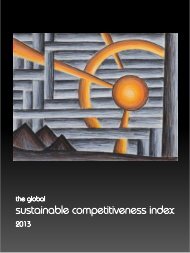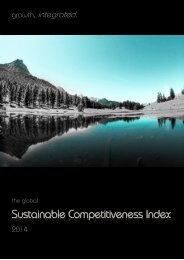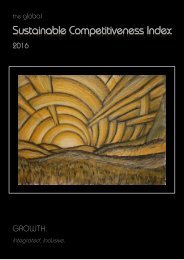The-Global-Sustainable-Competitiveness-Index-2015
Create successful ePaper yourself
Turn your PDF publications into a flip-book with our unique Google optimized e-Paper software.
Summary<br />
<strong>Sustainable</strong><br />
Competitive<br />
Natural<br />
Capital<br />
Social<br />
Capital<br />
Intellectual<br />
Capital<br />
Resource<br />
Management<br />
Governance Spotlight Data<br />
5 Social Capital<br />
<strong>The</strong> Social Capital of a nation is the sum of social stability and the well-being<br />
(perceived or real) of the entire population. Social Capital generates social<br />
cohesion and a certain level of consensus, which in turn delivers a stable<br />
environment for the economy, and prevents natural resources from being overexploited.<br />
Social Capital is not a tangible value and therefore hard to measure<br />
and evaluate in numeric values. In addition to local historical and cultural<br />
influences, the social consensus in a society is affected by several factors: health<br />
care systems and their universal availability/affordability (measuring physical<br />
health); income and asset equality, which are correlated to crime levels;<br />
demographic structure (to assess the future generational balance within a<br />
society); and freedom of expression, freedom from fear and the absence of<br />
violent conflicts that are required for businesses to be able to generate value.<br />
While a direct connection of social cohesion to creating wealth and sustain<br />
economic development might be difficult to establish scientifically, a certain<br />
degree of equality, adequate health systems, freedom from fear and equal<br />
opportunities (without which no American Dream ever would have been<br />
possible) are pre-requisites to achieve the same. <strong>The</strong> absence or deterioration of<br />
social cohesion in turn leads to lower productivity (health), rising crime rates, and<br />
potentially social unrest, paralysing economic development and growth.<br />
Social Capital Indicators<br />
<strong>The</strong> indicators selected to measure social cohesion have been selected from the<br />
5 themes above (health, equality, crime, freedom and age structure). Some of<br />
these indicators (e.g. “happiness”) are qualitative, i.e. not based on<br />
performance data that can be measured. Instead, qualitative indicators from<br />
surveys and other sources compiled by recognised organisations were used to<br />
measure the qualitative aspects of social cohesion, including single indicators<br />
from the Happy Planet <strong>Index</strong> (New Economics Foundation), the Press Freedom<br />
<strong>Index</strong> (Reporters Without Borders), and the <strong>Global</strong> Peace <strong>Index</strong> (Institute for<br />
Economics and Peace).<br />
Key elements of competitiveness<br />
drivers in the Social Capital Sub-<br />
<strong>Index</strong><br />
For the full list of used indicators, please refer to the methodology section.<br />
the sustainable competitiveness index <strong>2015</strong><br />
page 31








